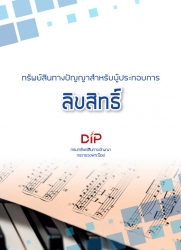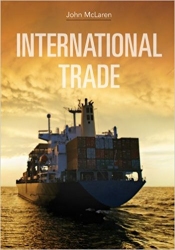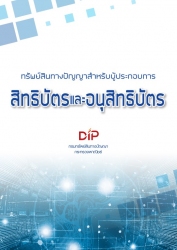
Author : ทรัพย์สินทางปัญญา, กรม
Publishing Date : Dec 29, 2021
ความรู้เกี่ยวกับสิทธิบัตรและอนุสิทธิบัตร
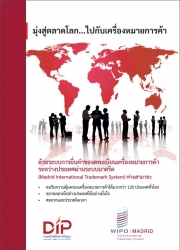
Author : ทรัพย์สินทางปัญญา, กรม
Publishing Date : Jan 26, 2022
คำแนะนำนี้มีวัตถุประสงค์หลักเพื่อผู้ขอจดทะเบียนและเจ้าของทะเบียนเครื่องหมายระหว่างประเทศ
รวมถึงเจ้าหน้าที่ของฝ่ายปกครองที่มีอำนาจของรัฐสมาชิกของสหภาพมาดริด โดยแนะนำเกี่ยวกับขั้นตอนต่าง ๆ
ของกระบวนการจดทะเบียนระหว่างประเทศ และอธิบายบทบัญญัติที่สำคัญของข้อตกลงมาดริด พิธีสารมาดริด
และข้อบังคับทั่วไป
Author : กรมทรัพย์สินทางปัญญา
Publishing Date : Jan 23, 2019
คู่มือและขั้นตอนการจดทะเบียนเครื่องหมายการค้าระหว่างประเทศภายใต้พิธีสารมาดริดในประเทศไทย
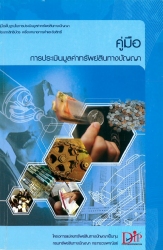
Author : กรมทรัพย์สินทางปัญญา
Publishing Date : Jul 13, 2020
คู่มือพื้นฐานในการประเมินมูลค่าทรัพย์สินทางปัญญาประเภทสิทธิบัตร เครื่องหมายการค้าและลิขสิทธิ์
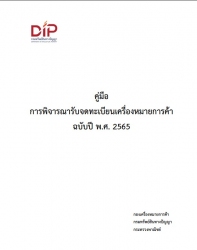
Author : ทรัพย์สินทางปัญญา, กรม
Publishing Date : Jan 24, 2022
กรมทรัพย์สินทางปัญญา ได้ปรับปรุงแก้ไข “คู่มือการพิจารณารับจดทะเบียนเครื่องหมายการค้า”
ฉบับนี้ขึ้น โดยมีวัตถุประสงค์เพื่อให้นายทะเบียนเครื่องหมายการค้าหรือผู้ที่เกี่ยวข้องใช้เป็นมาตรฐานในการ
ตรวจสอบและพิจารณารับจดทะเบียนเครื่องหมายการค้าให้เป็นไปตามพระราชบัญญัติเครื่องหมายการค้า
พ.ศ. 2534 และที่แก้ไขเพิ่มเติมและอนุบัญญัติที่เกี่ยวข้อง รวมถึงให้สอดคล้องกับแนวค าวินิจฉัยคณะกรรมการ
เครื่องหมายการค้าและค าพิพากษาศาลฎีกา ตลอดจนสอดคล้องกับมาตรฐานสากล โดยมุ่งเน้นอธิบาย
แนวทางปฏิบัติของนายทะเบียนเครื่องหมายการค้าให้มีหลักเกณฑ์ที่ชัดเจน ถูกต้อง ทันสมัย และเป็นไปใน
แนวทางเดียวกันเพื่อให้ผู้ยื่นขอจดทะเบียนเครื่องหมายการค้า ตัวแทน และบุคคลที่เกี่ยวข้อง ได้ทราบถึง
หลักเกณฑ์และวิธีการพิจารณารับจดทะเบียนเครื่องหมายการค้าที่มีบรรทัดฐาน ถูกต้อง และเป็นธรรม

Author : Gordon V. Smith
Publishing Date : Sep 13, 2017
Intellectual Property: Licensing and Joint Venture Profit Strategies
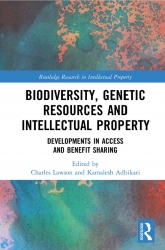
- Biodiversity, Genetic Resources and Intellectual Property Developments in Access and Benefit Sharing
Author : Kamalesh Adhikari, Charles Lawson
Publishing Date : May 04, 2020
Debates about Access and Benefit Sharing (ABS) have moved on in recent years. An initial focus on the legal obligations established by international agreements like the United Nations Convention on Biological Diversity and the form of obligations for collecting physical biological materials have now moved to a far more complex series of disputes and challenges about the ways ABS should be implemented and enforced: repatriation of resources, technology transfer, traditional knowledge and cultural expressions; open access to information and knowledge, naming conventions, farmers’ rights, new schemes for accessing pandemic viruses and sharing DNA sequences, and so on. Unfortunately, most of this debate is now crystallised into apparently intractable discussions such as implementing the certificates of origin, recognising traditional knowledge and traditional cultural expression as a form of intellectual property, and sovereignty for Indigenous peoples. Not everything in this new marketplace of ABS has been created de novo. Like most new entrants, ABS has disrupted existing legal and governance arrangements. This collection of chapters examines what is new, what has been changed, and what might be changed in response to the growing acceptance and prevalence of ABS of genetic resources.
Biodiversity, Genetic Resources and Intellectual Property: Developments in Access and Benefit Sharing of Genetic Resources addresses current issues arising from recent developments in the enduring and topical debates about managing genetic resources through the ABS regime. The book explores key historical, doctrinal, and theoretical issues in the field, at the same time developing new ideas and perspectives around ABS. It shows the latest state of knowledge and will be of interest to researchers, academics, policymakers, and students in the fields of intellectual property, governance, biodiversity and conservation, sustainable development, and agriculture.
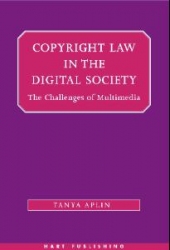
Author : Tanya Aplin
Publishing Date : Sep 10, 2014
examines the extent to which copyright and database right protect multimedia works. It does so from the perspective of UK law, but with due attention being paid to EU law, international treaties and comparative developments in other jurisdictions, such as Australia and the U.S. The central argument of the book is that the copyright and database right regimes are, for the most part, flexible enough to meet the challenges presented by multimedia. As a result, it is neither necessary nor desirable to introduce separate copyright protection or sui generis protection for multimedia works.
This important and original new work will be essential reading for any lawyer engaged in advising on IP matters relating to the new media industries, and scholars and students working in intellectual property and computer law.
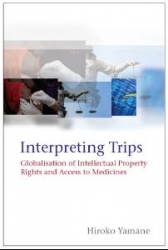
Author : Hiroko Yamane
Publishing Date : Sep 29, 2014
Protection of intellectual property rights (IPRs) has become a global issue. The Trade-Related Aspects of Intellectual Property (TRIPS) Agreement outlines the minimum standards for IPR protection for WTO members and offers a global regime for IPR protection. However, the benefits of TRIPS are more questionable in poorer countries where national infrastructure for research and development (R & D) and social protection are inadequate, whereas the cost of innovation is high. Today, after more than a decade of intense debate over global IPR protection, the problems remain acute, although there is also evidence of progress and cooperation.
This book examines various views of the role of IPRs as incentives for innovation against the backdrop of development and the transfer of technology between globalised, knowledge-based, high technology economies. The book retraces the origins, content and interpretations of the TRIPS Agreement, including its interpretations by WTO dispute settlement organs. It also analyses sources of controversy over IPRs, examining pharmaceutical industry strategies of emerging countries with different IPR policies.
The continuing international debate over IPRs is examined in depth, as are TRIPS rules and the controversy about implementing the ‘flexibilities’ of the Agreement in the light of national policy objectives. The author concludes that for governments in developing countries, as well as for their business and scientific communities, a great deal depends on domestic policy objectives and their implementation. IPR protection should be supporting domestic policies for innovation and investment. This, in turn requires a re-casting of the debate about TRIPS, to place cooperation in global and efficient R & D at the heart of concerns over IPR protection.
123NextLast


